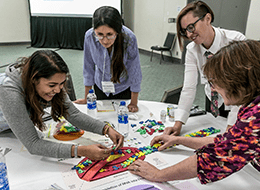Written by Nascent Transcript writer Jennifer Zieba
November 2018

Public interest in genetics and its uses is growing, and acknowledging this increase, several events at this year’s ASHG Annual Meeting went beyond research and addressed topics involving genetics education and public communication. These events reflect ASHG’s effort to not only promote genomic education but also provide professionals and trainees alike with ways to improve their communication skills beyond the bench, especially two sessions; the annual Undergraduate Genetics Education Workshop and an invited platform session entitled Achieving Genomic Literacy for the Masses.
The Undergraduate Genetics Education Workshop has occurred annually for the past 13 years as a full day workshop preceding the official start of the meeting. According to the workshop organizers, the purpose of this workshop is “to explore innovative and active pedagogies that are effective in teaching genetics concepts related to current, socially relevant themes.” These workshops are attended not only by current undergraduate professors, but also trainees, genetic counseling educators, and professionals who regularly communicate genetic information with those outside the field. Throughout the workshop, attendees had the opportunity to hone their pedagogical skills while learning new techniques and networking with current educators.
This year, the Undergraduate Genetics Education Workshop Working Group, chaired by Adam Hott, EdD, chose to focus on the development of pedagogy concerning CRISPR/Cas9 techniques in the undergraduate classroom. The workshop began with multiple talks on the history behind CRISPR/Cas9 technology and its current uses. Next came a presentation by Rivka Glaser, PhD, and Elizabeth Tuck describing a service learning project where Stevenson University STEM students worked directly with graphic design students to develop board and card games geared toward high school students learning about modern genetic techniques, some of which were submitted to the National Human Genome Research Institute (NHGRI) for eventual online distribution. The workshop continued with roundtable discussions where current educators presented their most recent pedagogical techniques and discussed the methodology and success of their execution in the classroom as well as advantages and disadvantages. At the end of the workshop, attendees took on the role of students using recently developed hands-on activities designed to aid in the understanding of molecular genetics. With genetics education becoming increasingly important, this annual workshop is a great place for trainees to improve their teaching skills and learn about career options in the educational field.
The invited session on Achieving Genomic Literacy for the Masses was well attended and covered topics such as K-12 education, undergraduate education, and genomic literacy within the general population. Ms. Tuck, Genomics Education Specialist at NHGRI, presented NHGRI’s efforts to “develop a national campaign to enhance genomic literacy” specifically for K-12 and undergraduate audiences. Ms. Tuck provided a key takeaway for her talk:
Teachers are a great community for trainees to engage–they are hungry to learn more about what’s really happening in science land these days, and they can teach you a lot about good science communication and classroom management. Get to know the teachers in your local community and listen to what they want or need out of a partnership, then design programs and activities together.
Sarah Elgin, PhD, from Washington University in St. Louis continued the session by outlining their efforts to decipher why genomics topics are typically not well covered in the undergraduate classroom and ways to include genomic analysis in undergraduate curriculums. Using bioinformatics tools as a platform, Dr. Elgin and colleagues have been able to design a discovery-based curriculum that takes minimal funding and equipment.
Finally, Chris Gunter, PhD, at Emory University, outlined Emory’s efforts to increase genomic literacy for the masses. Dr. Gunter mentioned that the traditional methods of science communication have been largely ineffective, especially in the case of genetics, and it is not enough to simply explain the science. Many fields are moving towards the idea of increasing social engagement via new media and public activities, while also being thoughtful and sensitive in social and political contexts. Overall, the Genomic Literacy session sparked some excellent discussions among attendees, and we hope to see more of this type of programming in the future.
While the ASHG Annual Meeting has been a great place to present and learn about cutting edge genetics research and techniques, these sessions illustrate the need to broaden outreach efforts and engage more fluidly with educators and the general public. As such, this type of programming will likely expand in the coming years, so be sure to take advantage during the next meeting in Houston, Texas, October 15–19. See you all there!
Resources generously provided by the workshop and invited session participants:
From Elizabeth Tuck (NHGRI):
PLEASE participate in National DNA Day (in whatever way you see fit) – see
https://www.genome.gov/dnaday/ for details; some ways to participate include:
- Participate in social media #DNADay19!
- Visit schools (or Skype), talk about cool science topics and/or career paths with students
- Host event at local community center, science center, library, etc. with hands-on activities
- Attend/participate in a local science festival + do hands-on activities
- Participate in a Nerd Nite or Science Café program
- Write an article for your local paper, etc.
- Get creative – what speaks to you? Contact dnaday@nih.gov
Contribute your events at https://www.genome.gov/27563858/register-an-event/
- From Sarah Elgin (Washington University in St. Louis)
Washington University in St. Louis Genomics Education Partnership Website: http://gep.wustl.edu
GCAT-SEEK: A NSF-funded network promoting genomics integration into the undergraduate classroom https://gcat-seek.weebly.com - Dynamic Gene, CSHL Dolan Center: Educational outreach resource; annotating rice, corn; bar-coding https://www.dnalc.org/websites/dynamic.html
- HHMI SEA (Phage hunters freshman course): Science Education Alliance, a resource for research based classroom education https://www.hhmi.org/developing-scientists/science-education-alliance
- Genome Solver (metagenomics): Georgetown, a community of faculty and students interested in the science of the Human Microbiome Project (HMP).
http://gli.georgetown.edu/genome/ - G-OnRamp: Generating a browser for a new genome http://gonramp.org (Genomics Education Partnership + Galaxy)
